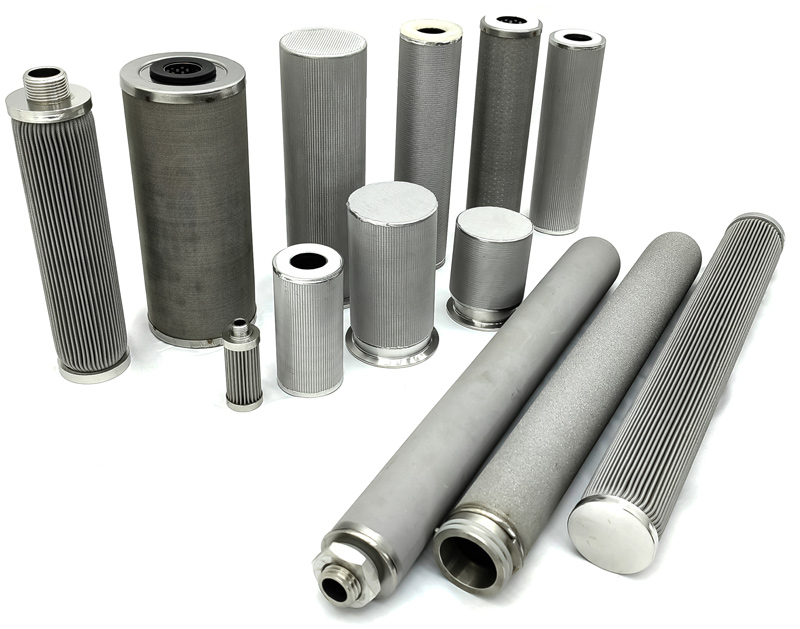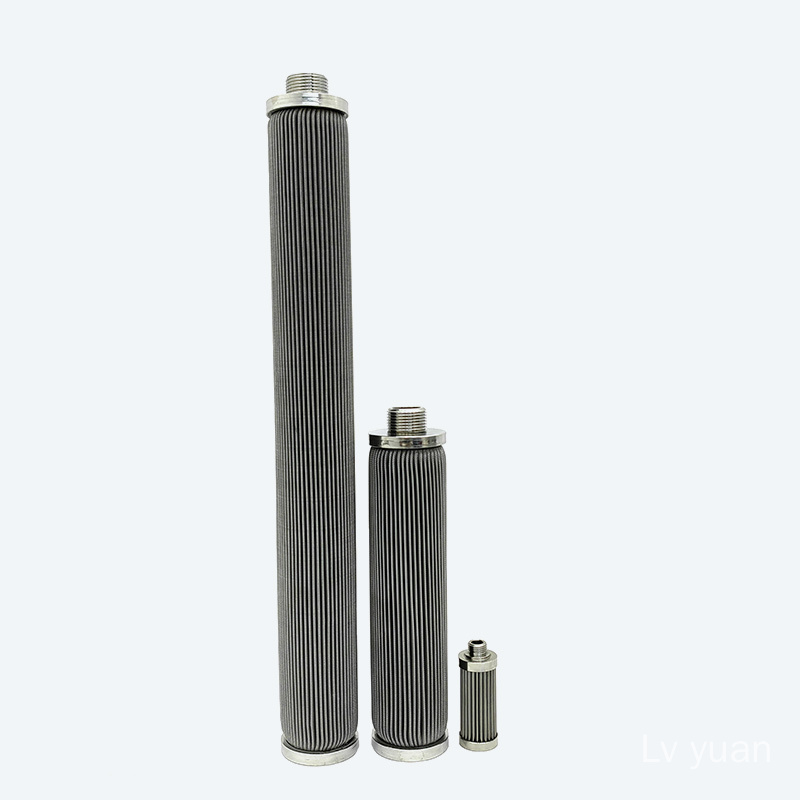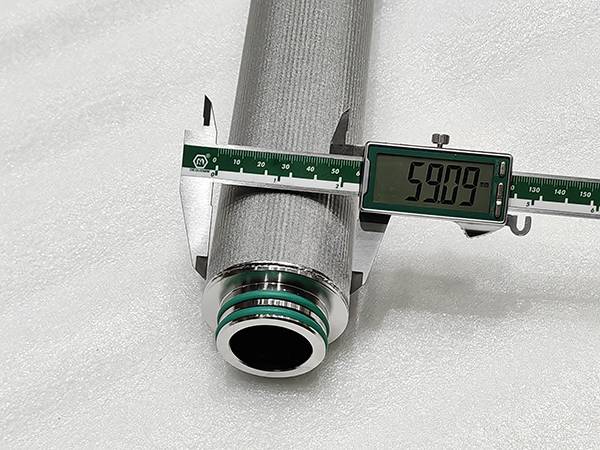Application of sintered metal filters in the food industry
Sintered metal filters provide the food industry with improved filtration performance that protects products from contamination and improves quality standards. These filters offer outstanding durability and reliable performance when used for gas, liquid and powder filtration. Food processing plants use sintered metal filters to clean production air, filter juice and dairy products, and produce powdered food ingredients. Food manufacturers can improve product consistency and meet safety requirements by selecting sintered metal filters that meet their specific requirements for pore size, material compatibility, and operating temperature and pressure specifications.
- Introduction to sintered metal filters
- Key benefits of sintered metal filters in food processing
- Improved filtration efficiency
- Improved food safety and quality
- Durability and longevity in harsh environments
- Applications of sintered metal filters in the food industry
- Filtration of liquids in food production
- Air filtration for food processing plants
- Powder filtration in food additives and ingredients
- Choosing the right sintered metal filter for food applications
- Factors to consider when selecting a filter
- Common Types of Sintered Metal Filters for Food Industry
- Conclusion
Introduction to sintered metal filters
The food industry relies on high standards of product quality and safety in its modern operations. Sintered metal filters are an essential technology for maintaining the required standards in food production systems. The food industry relies on sintered metal filters operating at various stages of production to achieve better quality control and food safety performance and to ensure product consistency.
Sintered metal filters perform critical functions in food production plants due to their essential characteristics. This article examines sintered metal filters and their specific food processing applications that enhance filtration system performance.

Key benefits of sintered metal filters in food processing
Sintered metal filters have found their place in the food industry because they offer a number of benefits that improve safety measures, production speed, and extend the life of equipment. The following benefits summarize how sintered metal filters contribute to food processing operations.
Improved filtration efficiency
Sintered metal filters provide exceptional filtration performance by removing all types of particulates from food processing liquids, gases, and powders. Sintered metal structures, consisting of the fusion of metal particles, result in porous, rigid materials that provide better uniform filtration performance than conventional filter media. The filtration process captures all particles, including fine particles, resulting in improved food product purity.
The use of sintered metal filters in liquid food production ensures that no unwanted particles are left behind, resulting in a cleaner, more consistent product in beverages and sauces. Sintered metal filters have excellent filtration capabilities, making them suitable for both industrial production and specialized food processing requirements.
Improved food safety and quality
The food industry is subject to strict regulations, yet it remains essential to maintain stringent operational safety measures. Sintered metal filters enhance food safety by providing consistent filtration methods that remove hazardous contaminants such as pathogens, heavy metals, and chemical impurities from food materials. Sintered metal filters provide a comprehensive improvement in the level of quality and safety of food products.
Despite operating in demanding environments that include heat and intensive cleaning protocols, the filters demonstrate resistance to prevent contamination while providing reliable operation. These filters use continuous filtration to help food manufacturers meet international safety requirements.
Durability and longevity in harsh environments
The food industry chooses sintered metal filters because of their outstanding durability. Sintered metal filters offer superior durability by resisting the damaging effects of paper, fabric, and plastic filters. Sintered metal filters offer excellent durability, allowing them to operate reliably for extended periods of time in harsh process conditions.
Extended service life reduces the need for filter changes, lowering production costs for manufacturers. Sintered metal filters have long-life characteristics that enable industrial food filtration systems to operate at a reduced cost to food manufacturers.
Applications of sintered metal filters in the food industry

The versatility of sintered metal filters allows them to be used in many stages of food processing. Sintered metal filters excel at filtering three different types of material, including liquids, gases, and powders, making them essential for multiple applications.
Filtration of liquids in food production
Sintered metal filters are used to remove solids and contaminants in the processing of liquid food products such as juices, wines, and dairy products. The filters enable liquid food products to maintain both their purity standards and consistency levels. Sintered metal filters meet your filtration needs while maintaining operational flow and efficiency.
In juice production, for example, sintered metal filters are used to extract pulp and impurities, resulting in a clear final product. In dairy processing, sintered metal filters remove fat particles to produce clear, high-quality dairy products.
Air filtration for food processing plants
Sintered metal filters are used in food production facilities for air filtration as a basic application. Food production facilities use these filters to purify air by removing dust particles along with microorganisms and other environmental contaminants. The use of sintered metal filters is necessary to protect food from contamination during processing and packaging operations while providing a clean and safe working environment.
Sintered metal filters provide maximum value in sterile production environments such as packaged foods and dietary supplements by effectively managing air quality, which has a direct impact on product safety.
Powder filtration in food additives and ingredients
Sintered metal filters are essential filters in the manufacture of food additives, flavors, and powdered ingredients. Sintered metal filters produce uniform consistency in powdered food products. The production of spices, instant soup mixes, and powdered beverages requires sintered metal filters to achieve the desired texture and quality.
Choosing the right sintered metal filter for food applications
Several elements must be evaluated when selecting sintered metal filters for food processing applications. Several elements about the type of food being processed and the filtration requirements, together with the operating conditions, will help determine which filter will work best for the application.
Factors to consider when selecting a filter
Filter pore size: The degree of filtration depends on the pore size of the sintered metal filter. The degree of filtration required will determine whether a small-pore or large-pore filter should be used.
Material compatibility: The filter material must be compatible with the food processing material to prevent both product contamination and degradation.
Temperature and Pressure Resistance: Filters operating in high-temperature and high-pressure conditions need to maintain their structural integrity under such extreme conditions.
Common Types of Sintered Metal Filters for Food Industry

There are three main types of sintered metal filters on the market, including sintered mesh, sintered powder, and sintered metal foam, which meet different filtration requirements. Food processing plants need to select their industrial filtration equipment according to the specific characteristics of their food products.
Conclusion
Sintered metal filters are essential elements in the food industry, offering superior filtration performance combined with improved quality standards and economical operation. The combination of durability and versatility makes sintered metal filters critical to maintaining the food quality standards that manufacturers and consumers demand. The future development of the food industry will rely on sintered metal technology as it leads filtration innovation to provide modern solutions for the production of safe, high-quality food products.
By choosing the right filtration solutions, including sintered metal filters, food manufacturers can increase processing speeds and deliver superior products while meeting all safety requirements.
As an industry elite, we have always been committed to providing customers with high-quality products and services. If you have such needs, please visit Lvyuan official website for further consultation and understanding.

What is Sintered Metal Filter? Complete Guide

Sintered PTFE Filters: Advanced Filtration for Demanding Environments

Metal Sintered Filters: Precision Filtering to Drive Industrial Upgrading

Choosing Sintered Filters: An Overview for Industrial Applications

What is a Sintered Metal Filter Disc? A Comprehensive Guide

What Are Sintered Metal Filters and How Do They Work?
Metal mesh filters
What maintenance is required for sintered wire mesh filter?
Regular cleaning is the primary maintenance for sintered wire mesh. The cleaning frequency depends on the application and the type of contaminants being filtered. Follow the manufacturer's guidelines for proper maintenance.
Sintered Metal Filter
Are industrial sintered metal filter cartridges environmentally friendly?
Yes, these cartridges are environmentally friendly due to their reusability and longer lifespan, contributing to reduced waste generation compared to disposable filters.
Stainless Steel Cartridge Filter Housing
What are the benefits of using stainless steel cartridge filter housings?
Stainless steel cartridge filter housings offer corrosion resistance, durability, and hygiene, making them suitable for use in a wide range of industries, including food and beverage, pharmaceuticals, chemicals, and water treatment.
Sintered Powder Filters
What are the key advantages of sintered powder filters?
Sintered powder filters offer high filtration efficiency, durability, resistance to temperature and corrosion, and customization options in terms of shape, pore size, and material.
How do I choose the right sintered powder filter for my application?
Choosing the right sintered powder filter involves considering factors such as filtration accuracy, temperature and pressure requirements, material compatibility, and specific application needs. Consultation with experts is recommended for optimal selection.

Bag filter housing
Bag filter housings are essential components in industrial filtration systems, designed to remove contaminants from liquids. To enhance the functionality and efficiency of bag filter housings, various features can be incorporated.

Sintered powder metal filters
Sintered powder metal filters are crafted from compressed and sintered metal powders, forming a porous structure. Porosity: 28%-50% Permeability: 0.02-20L/cm²minPa Pressure Resistance: 0.5Mpa Temperature Resistance: Less than 280℃

Stainless steel multi cartridge filter housing
Discover unparalleled filtration efficiency with our Stainless Steel Multi Cartridge Filter Housing – a testament to precision engineering and reliability.

Sintered wire mesh filter
Benefit from outstanding high-pressure resistance and consistent filtration efficiency with our sintered metal mesh. Our sintered wire mesh finds versatile applications in diffuser screens, centrifuges, breather vents, fluidized beds, chromatography, polymer processing, petrochemical industries, hydraulic filters, and more.

Sanitary filter housing
This filter housing will allow you to filter large volumes of nanoemulsion with ease. Sanitary vent and drain valves permit easy venting, draining, sampling, or integrity testing operations. The new cartridge locking design features additional cut-outs for traditional half-moon portions of the Code 7 bayonet locks, enhancing clean ability and drain ability.

stainless steel filter water
Our sintered stainless steel filter stands as a pivotal filtration element crafted through a meticulous sintering process, with stainless steel serving as the core material.

Stainless Steel Duplex filter housing
As the manufacturer, we offer a comprehensive range of Duplex Filter Housings designed to provide efficient and reliable filtration solutions for various industrial applications.

Stainless steel pleated filter cartridge
Our Stainless Steel Pleat Filter Cartridge constructed from high-quality SS 304 or SS 316L material, this filter exhibits exceptional resistance to high temperatures and rust.
© 2024 All Rights Reserved. | Privacy policy • Terms and conditions
